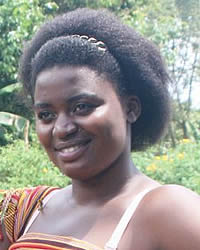Somali Bantu in Kenya

Photo Source:
Emmanuel Adiba - Wikimedia
Creative Commons
|
Send Joshua Project a map of this people group.
|
| People Name: | Somali Bantu |
| Country: | Kenya |
| 10/40 Window: | No |
| Population: | 118,000 |
| World Population: | 1,129,400 |
| Primary Language: | Maay |
| Primary Religion: | Islam |
| Christian Adherents: | 0.05 % |
| Evangelicals: | 0.03 % |
| Scripture: | Portions |
| Ministry Resources: | No |
| Jesus Film: | Yes |
| Audio Recordings: | Yes |
| People Cluster: | Bantu, Swahili |
| Affinity Bloc: | Sub-Saharan Peoples |
| Progress Level: |
|
Introduction / History
The Somali Bantu are a group of black African communities in Southern Somalia, where they also call themselves Jareerweyne. Some of them were brought to Somalia in the 1800s as slaves, while others have lived in Somalia for many centuries. They are united by their second-class status within Somali Society and by the racial discrimination and persecution they have faced there.
The Somali Bantu suffered horrible during the civil war in Somalia in the 1990s and many thousands fled to neighboring Kenya. Since then, there has been a continuous flow of additional refugees due to insecurity and oppression but also due to famine.
In the 30 years since the first Somali Bantu refugees came to Kenya, an entire generation has grown up who have never been to Somalia. They have been refugees without a home their whole lives. This has lead to significant changes in their culture and community structures as the children attend Kenyan schools and live among many different ethnic groups.
While Somali Bantus are given refugee status in Kenya, most are required by law to live in designated refugee camps. These are the camps of Dadaab and Kakuma, situated in remote desert regions.
Some Somali Bantus are permitted to live as urban refugees in Nairobi or Mombasa, while others have decided to move to those cities illegally in search of work. Often, families are divided with some members in either refugee camp and some seeking jobs in the cities.
What Are Their Lives Like?
As Somali Bantu are unable to move freely in Kenya or get work permits, most are stuck in perpetual limbo living as refugees in camps. They receive basic services like food, shelter, education and healthcare from international organizations, but over the past years multiple cuts to international aid have severely reduced the amount of food they are given, leading to hunger and the necessity to find other sources of income.
A few Somali Bantu have found employment with aid organizations and others have managed to start small businesses. Many who have gone to Nairobi in search of employment have faced very difficult working conditions and continued discrimination from other Somalis.
Many Somali Bantu refugees in Kenya have faced horrible trauma, both during their flight from Somalia and during their time in the refugee camps. Many women have been raped and many families have lost children to illness and starvation.
What Are Their Beliefs?
Almost all Somali Bantu are Sunni Muslims, and many adhere to strict Islamic dress code and behavior norms. However, most Somali Bantu have very little knowledge of Islam. Among the older generation, many believe in or even practice witchcraft and spirit possession cults. Among the younger generation, many are secularized.
A very small number of older Somali Bantu adopted Christianity in Somalia in the 1960s and 1970s, when Catholic and Mennonite missionaries served in their area. Most of them did not pass on their faith to their children. A handful of Somali Bantu have also become Evangelical believers in Kenya.
What Are Their Needs?
Most Somali Bantu in Kenya will never be resettled as refugees to a Western country, but many will also never be able to return to Somalia. They need a pathway to permanent residence or citizenship in Kenya so that they are able to start a normal life and provide for their own needs. They also need access to better healthcare and education to find a way out of poverty and dependence. And as long as they are stuck in the refugee camp, they desperately need full food rations to avoid malnutrition and starvation.
Most of all, the Somali Bantu need access to contextualized Gospel materials in their own language and to believers who will share their faith with them.
Prayer Points
Pray for the Somali Bantu in the refugee camps to have their physical needs like food and healthcare met. Pray that they will find opportunities for jobs and businesses so that they can support themselves.
Pray for emotional and mental healing of the many traumas they have endured. Pray for the Holy Spirit to heal the wounds of their heart and give them the strength to pursue life.
Pray for Kenyan believers to come alongside them to support them and to share their faith. Pray for access to contextualized Gospel materials in their own language.